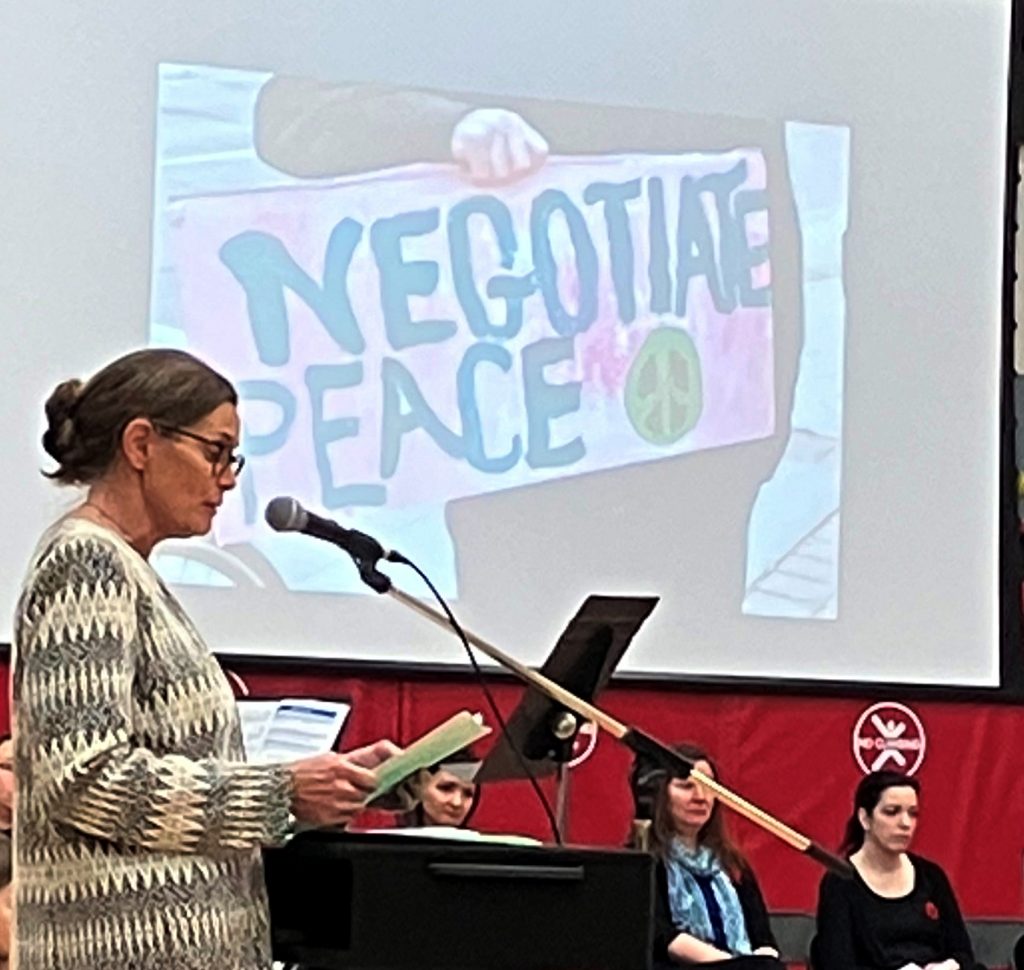
Nov. 10, 2022: Rachel Reesor-Taylor speaking to students and staff of Dugald School, in Dugald, MB. Photo: Paul S. Graham
By Rachel Reesor-Taylor
 C’est un grand privilège d’être parmi vous ce matin pour commémorer le Jour du Souvenir. Paul and I are happy to represent Peace Alliance Winnipeg here on this solemn occasion.
C’est un grand privilège d’être parmi vous ce matin pour commémorer le Jour du Souvenir. Paul and I are happy to represent Peace Alliance Winnipeg here on this solemn occasion.
Nous portons des coquelicots rouges pour ne jamais oublier les soldats qui ont donné leur vie pour leur pays. Nous nous rappelons leur grand courage et leur sacrifice ultime.
We are here to remember the soldiers who died serving their country. Personally, I think of my husband’s great uncle Francis Taylor from Nfld who was only 17 years old when he joined the First World War. Imagine how very young he was, and what a loss to his family.
 That war, 100 years ago, was sometimes called “The War to End War,” or “The War to End All Wars.” If only it had ended war! But it didn’t. We have had lots of wars in the last 100 years.
That war, 100 years ago, was sometimes called “The War to End War,” or “The War to End All Wars.” If only it had ended war! But it didn’t. We have had lots of wars in the last 100 years.
We know that many people who now live in Canada, and here in Manitoba came to escape wars in their countries. They had to leave their home to find peace.
We wear a red poppy to remember the soldiers who have died in these wars. We do not want their sacrifice to be in vain.
 Que signifie le coquelicot blanc? C’est pour se souvenir de toutes les victimes des guerres : les enfants, les parents, les vieillards, et pour dire non à la guerre.
Que signifie le coquelicot blanc? C’est pour se souvenir de toutes les victimes des guerres : les enfants, les parents, les vieillards, et pour dire non à la guerre.
In England, after the First World War, people who remembered how the war had killed their friends and family wanted to tell the government not to start another war. They thought the best way to honour soldiers was to make sure people didn’t have to die in any more wars.
They made up the white poppy as a symbol to say “…War must not happen again” and gave them out to people on Remembrance Day.
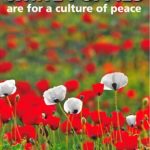 The white poppy campaign reminds us that these days war kills mostly ordinary people, not mostly soldiers. It reminds us that war pollutes the environment.
The white poppy campaign reminds us that these days war kills mostly ordinary people, not mostly soldiers. It reminds us that war pollutes the environment.
Le coquelicot nous rappelle que même pour les adultes, lors d’un conflit, il est mieux d’utiliser ses mots au lieu de se battre!
Peace Alliance and the White poppy campaign are convinced that war is not a good way to solve problems: Supporting war can make kids think violence is Ok.
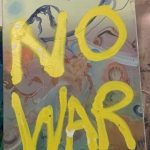 Le coquelicot blanc nous rappelle que nous pouvons tous et toutes, ensemble, participer à la construction d’un monde meilleur.
Le coquelicot blanc nous rappelle que nous pouvons tous et toutes, ensemble, participer à la construction d’un monde meilleur.
How do we build a better world? How do we build a culture of peace?
Après la deuxième guerre mondiale, beaucoup de pays se sont mis ensemble pour créer les Nations Unies.
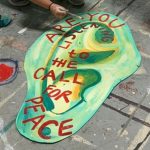 Imagine that! So many countries did not want to see another war. They believed that the best way to avoid a war was to get together, cooperate, help each other and agree on fair play. As the United Nations, they would respect each other, protect the rights of all people in all countries. The tools they chose are cooperation, development, mediation, negotiation, fairness.
Imagine that! So many countries did not want to see another war. They believed that the best way to avoid a war was to get together, cooperate, help each other and agree on fair play. As the United Nations, they would respect each other, protect the rights of all people in all countries. The tools they chose are cooperation, development, mediation, negotiation, fairness.
 Le monde, c’est comme un grand terrain de jeux. Dans les Nations Unies les pays se mettent ensemble pour créer les règles de jeux. Les Nations Unies s’occupent des droits de la personne, pour protéger l’environnement, le bien-être des enfants, de tous les peuples.
Le monde, c’est comme un grand terrain de jeux. Dans les Nations Unies les pays se mettent ensemble pour créer les règles de jeux. Les Nations Unies s’occupent des droits de la personne, pour protéger l’environnement, le bien-être des enfants, de tous les peuples.
 Everyone wants peace. Even wars are fought to bring peace.
Everyone wants peace. Even wars are fought to bring peace.
Comment décrire la paix ?

Think about it. The peace we want for all is not just the absence of war. Could we be happy when there is no war in our country if we have no food?
Est-ce que on serait heureux si on n’a pas de domicile, si on est sans abbris? Est-ce qu’on serait en paix ? Il n’y a peut-être pas de guerre, mais si on n’est pas en sécurité dans notre famille, ce n’est pas encore la paix.
Can we pollute the environment, the water, the air, the land and expect to live in peace? What does peace look like?

It’s people cooperating. Getting along with their neighbours. Helping their neighbours. Respecting their neighbours. When everyone has the food they need, the shelter they need, the education they need, the healthcare they need. When everyone is treated fairly. When the environment is respected, that will help bring peace.

Peace is something that we have to work at and build. It won’t just happen without great effort.

An example of the work of the United Nations is UNICEF. The United Nations Children’s Fund. Their job is to help children all around the world. Maybe you have heard of it. When I was a child we were given UNICEF boxes to collect money when we went out Trick or Treating at Halloween. That was children helping children.
 Maybe that is old fashioned. Now, you have new ways for children to help other children, near and far.
Maybe that is old fashioned. Now, you have new ways for children to help other children, near and far.
Whenever we help a neighbour, respect the rights of a neighbour, cooperate, protect the environment, we help to build peace. It starts in our homes, our classrooms, our school, our neighbourhood, our country and it spreads around the world.
The same tools, the same practices work at every level. La coopération, le respect, l’entre-aide : voilà les outils de la paix chez nous et autour du monde.

Young people can do amazing things! There is an example in Winnipeg: Some high school students convinced City Hall in Winnipeg to ask the Canadian Government to sign the United Nations treaty to ban nuclear weapons.

Every year, remembering the nuclear horrors of Hiroshima and Nagasaki, and all the people who died, many people create peace lanterns to say “no to nuclear weapons.” Children participate in this, too.
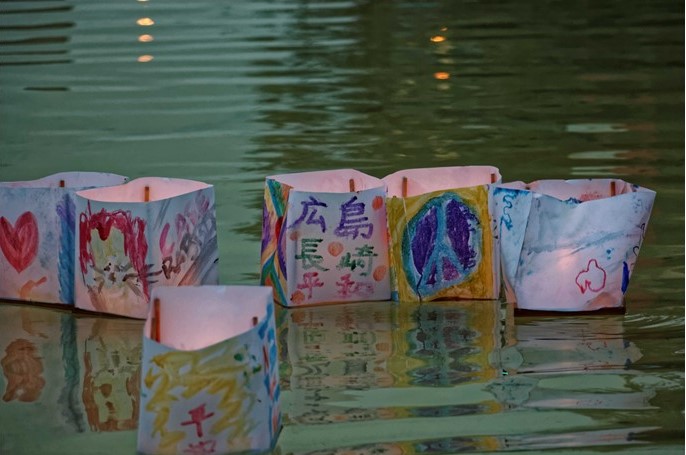
We might feel small, but there is an old song that has a great image of how powerful we are when we work together.

Drops of water turn a mill; singly none.
One or a few drops of water could never turn that huge wheel to do the work, but many drops make a stream or a river or a waterfall. Together we can do amazing things.

J’ai une dernière image pour vous ce matin. Devant les bureaux des Nations Unies à New York, il y a une très grande statue. ‘Let Us Beat Swords into Plowshares.’ It was inspired by a very old vision from the prophet Isaiah in the Bible.
and they shall beat their swords into ploughshares, and spears into pruning hooks; nation shall not lift up sword against nation; neither shall they learn war any more.
People have been longing for peace for thousands of years. They had the vision of a world without war. Instead of making tools for war, they can make tools to grow food, tools to build peace.
With the poppies we remember and honour those who have died in wars. They were dying for peace, so let us build peace. In memory of them, construisons la paix!
Rachel Reesor-Taylor delivered this address to the students and staff of École Dugald School, in Dugald, MB at their Remembrance Day Ceremony on Nov. 10, 2022.


5 comments for “Because we remember them… construisons la paix”